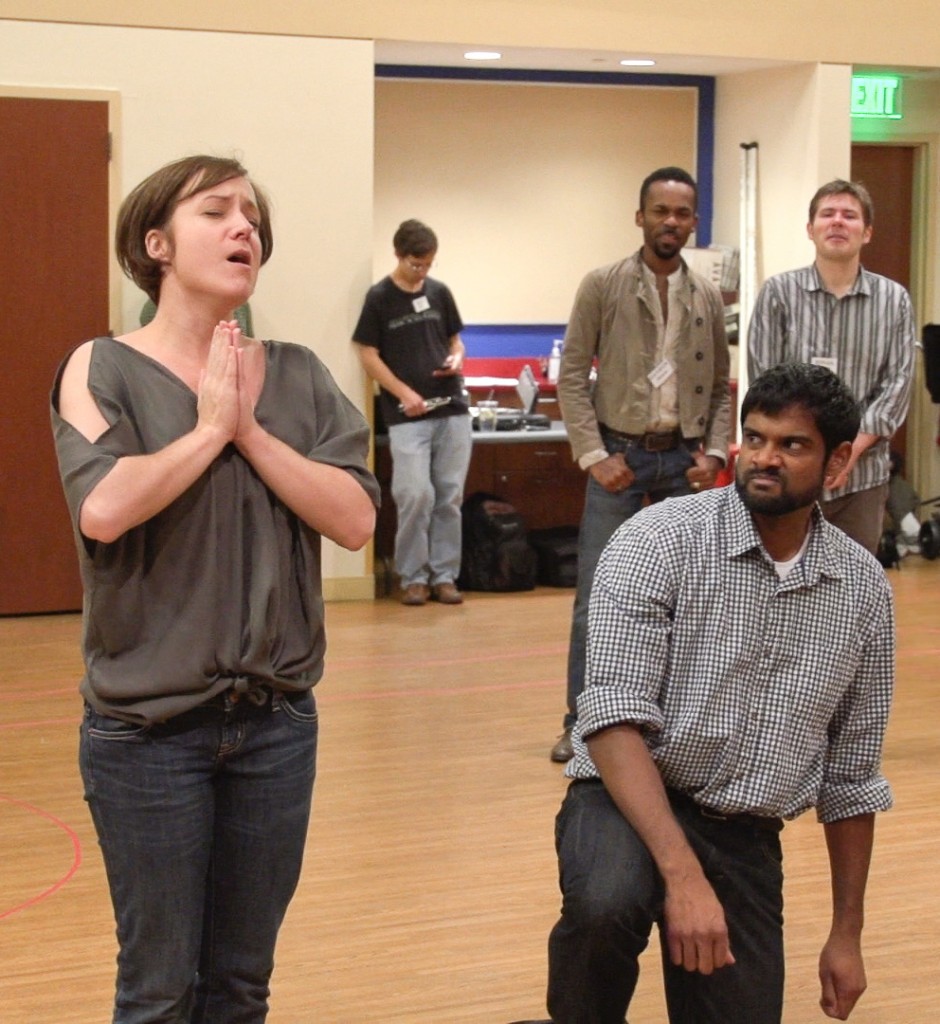Berlioz’s rarely heard Shakespearean comedy to open Opera Boston season

Julie Boulianne and Sean Panikkar in rehearsal for Opera Boston's production of Berlioz's "Beatrice et Benedict," which opens Friday night. Photo: Kathy Wittman/Ball Square Films
In the concert hall, Hector Berlioz is a household name. His Symphonie fantastique has long been a fixture on classical music’s Top 40 charts. With its haunting idee fixe, beguiling waltz and the sinister Dies Irae motif of its “Witches’ Sabbath” finale, the colorful piece is a favorite of orchestras and audiences alike.
It’s a different story in the opera house. On Friday Opera Boston opens a three-performance run of Berlioz’s Beatrice et Benedict, a setting of Shakespeare’s comic Much Ado about Nothing that rarely shows up on even large opera company’s schedules.
Berlioz had a theatrical bent and was constantly plotting operatic projects. But his desire to push the musical envelope often undermined his chances for success. Benvenuto Cellini, which had its premiere in 1838, contains some of Berlioz’s most brilliant writing. But its combination of comedy and tragedy and a confused plot can make it difficult for audiences to comprehend. Les Troyens, composed between 1856 and 1858, is so massive that presenting it in a single evening is a major challenge. Only recently, with the advent of visual projections, have opera companies warmed up to The Damnation of Faust. That work from 1846 is full of sumptuous melody and inventive orchestration, but its format even confused Berlioz himself, who first called it an opera de concert, then a legende dramatique.
It’s more difficult, however, to understand why the effervescent Beatrice et Benedict, Berlioz’s final opera, introduced in 1862, is not mounted more often. Its tale of attractive young lovers who don’t want to admit that they adore each other is as fresh as any well-done Hollywood romantic comedy. It contains Berlioz’s signature lyrical tunes, swift pacing and intricately shaded orchestration.
One of the problems can be its combination of spoken dialogue and song.
“Here in Boston,’’ said Julie Boulianne, the French-Canadian mezzo-soprano who portrays the feisty Beatrice, “I think they solved one of the major problems by having the dialogue done in English. There’s a lot of dialogue.”
“Dialogue always presents its own challenges,’’ said Sean Panikkar, an American tenor of Sri Lankan heritage who sings Benedict, the confirmed bachelor who finds himself captivated by Beatrice. Both Panikkar and Boulianne are making their Opera Boston and role debuts in this production created for the company. Gil Rose, the company’s artistic director, conducts. Stage direction is by David Kneuss, and Robert Perdziola is the scenic designer.
“Opera singers generally aren’t trained in the way of speaking onstage,” said Panikkar. “All of our choices are made for us on the page—in terms of dynamics or tempo or whatever. In a dialogue situation, there’s nothing to go on. There are hundreds of different ways you can do something.”
Berlioz wrote his own libretto, hewing closely to Shakespeare’s language. Though this production is updated to the Sicily of the 1950s rather than the sixteenth century, the dialogue retains its Shakespearean cadences, according to Panikkar.
“The music is beautiful,” said Boulianne. “It’s very entertaining and it’s short [90 minutes],” Panikkar added. “There’s no reason why it shouldn’t be performed more.”
A week before opening night, the pair was still getting used to making a smooth shift between spoken dialogue and full-blown operatic singing.
“Since we’re not being amplified in the dialogue,’’ said Panikkar, “we’re still having to support the voice as if we were singing anyway. So in that sense, it’s not that much of a change. The issue is more the tempo of the dialogue and setting the mood for the transition into music or out of the music into the spoken scene.”
Thanks to the intimate size of Opera Boston’s home theater, the 1,186-seat Cutler Theatre at Emerson College, the singers don’t have the added challenge of shifting between amplified spoken text and unamplified singing.
Both Boulianne and Panikkar are newcomers to their roles as Berlioz’s embattled lovers. But given her French background, Boulianne has preformed the composer’s music often.
“As a French speaker, I’ve done a lot of Berlioz,” she said, “Les nuits d’ete, Romeo and Juliette [a choral symphony] and some of the songs. But this is my first [Berlioz] opera. I’ve wanted to do this role for a long time.”
Kneuss, the Metropolitan Opera’s executive stage director, has updated the action to the 1950s, and Perdziola’s costumes include crisp, knee-length dress with nipped waists and full skirts that bring to mind Grace Kelly and the ladies of the hit TV series Mad Men. Kneuss and Perdziola created a new production of Offenbach’s La Grande-Duchesse de Gerolstein for the company last season.
“Beatrice is not a typical ‘Mad Men’ girl,’’ said Boulianne with a laugh. “She is probably most like Peggy, the character who is trying to have a career.”
“The story itself is timeless,” said Panikkar, “so it works in any time period. The only changes are made to the costumes and sets and the way you actually move on stage. It’s not that big a stretch.”
The cast also includes soprano Heather Buck as Hero, baritone David McFerrin as Claudio, Robert Honeysucker as Don Pedro, mezzo-soprano Kelley O’Connor as Ursule and bass Andrew Funk as Somarone.
Beatrice et Benedict will be performed 7:30 p.m. Oct. 21 and 25 and 3 p.m. Oct. 23. operaboston.org. 617-451-9944.
Posted in Articles



